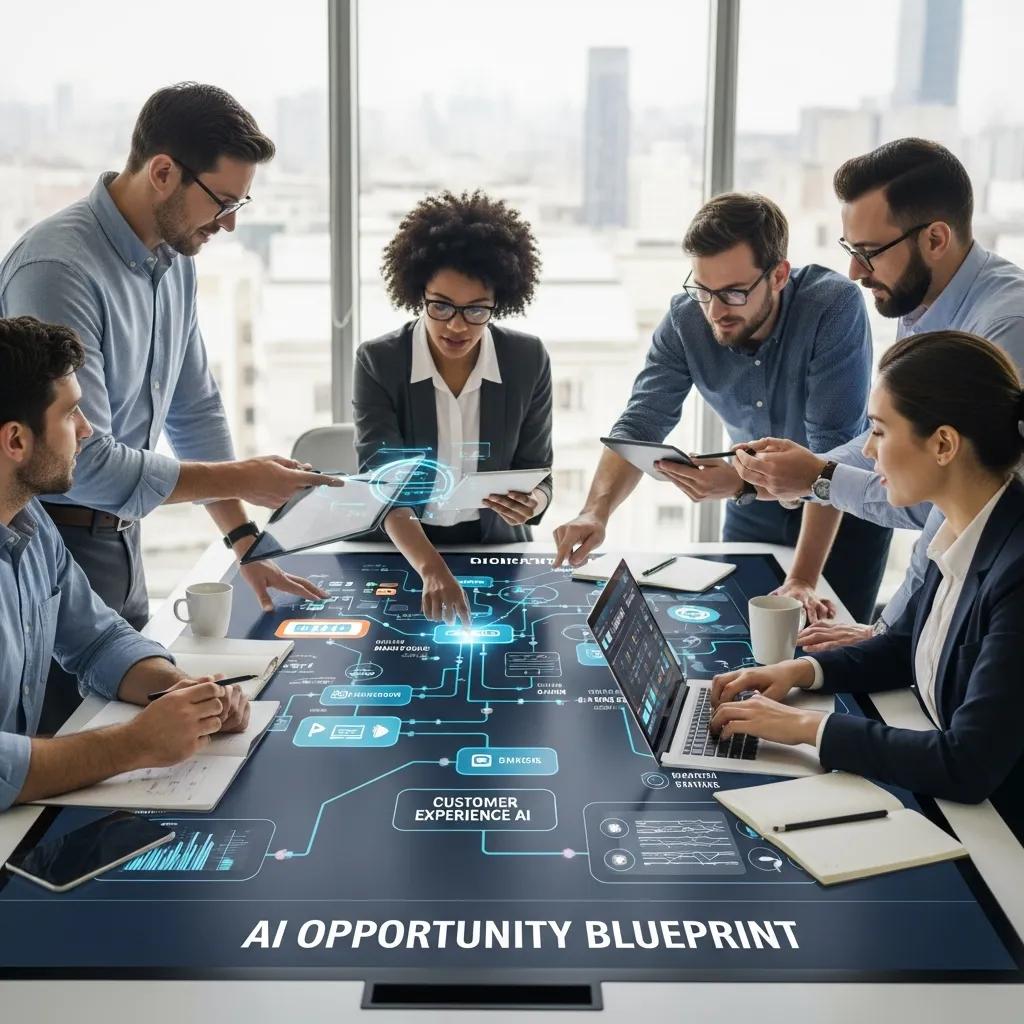Cultivating AI Expertise Within Your Team
Cultivating AI expertise within teams is essential for modern businesses striving to thrive in an increasingly digital landscape. Many organizations face challenges in integrating artificial intelligence effectively, leaving them at a disadvantage. This article will explore key AI competencies necessary for improved collaboration and offer clear strategies to develop these skills within your team. By reading this post, leaders will gain insights into fostering a culture that emphasizes AI knowledge, ultimately enhancing team performance and productivity. Addressing the gap in AI skills will position your organization for success in today’s competitive market.
Essential Key Takeaways for Developing AI Skills in Teams
- Building AI skills within teams drives successful digital transformation and enhances employee capabilities
- Collaboration improves significantly when team members have a strong understanding of AI
- Continuous learning in AI fosters innovation and encourages knowledge sharing among team members
- Measuring AI skill development reveals insights on training effectiveness and impacts overall team performance
- Emphasizing a culture of openness to AI integration leads to improved collaboration and productivity
Understanding the Importance of AI Skills in Teams

Building AI skills within teams, supported by a fractional chief ai officer, is essential for driving successful digital transformation. Training employees in artificial intelligence not only enhances their capabilities but also empowers them to leverage intelligent solutions effectively in their daily work.
Moreover, as organizations increasingly deploy AI applications in human resources, equipping teams with the necessary skills becomes even more critical. This knowledge enables them to streamline recruitment processes, enhance employee engagement, and improve decision-making. Ultimately, a well-versed workforce can maximize the potential of AI technologies, driving innovation and improving overall business performance.
Effective collaboration during meetings can be significantly improved when team members possess a strong understanding of AI. This shared knowledge promotes confidence and encourages innovative thinking, allowing teams to harness the full potential of AI for better decision-making.
Teams that prioritize developing AI expertise benefit from increased efficiency and productivity. By integrating AI skills into their workflow, organizations can create a culture of continuous improvement and adaptability in an ever-changing marketplace:
This not only streamlines processes but also empowers employees to focus on more strategic tasks. By leveraging AI, teams can enhance their decision-making capabilities, ultimately leading to higher engagement levels. Moreover, ai enhancing employee satisfaction is a crucial outcome, as staff feel more valued when technology aids their efforts rather than replaces them.
- Invest in training programs focused on AI skills.
- Encourage regular collaboration and knowledge sharing.
- Foster an environment open to new technologies and methods.
Now that the teams understand why AI skills matter, it’s time to pinpoint what those skills are. Identifying key AI competencies will strengthen collaboration and drive success.
Identifying Key AI Competencies for Enhanced Collaboration

To build a team proficient in AI, leadership must focus on key competencies that enhance collaboration. Understanding AI systems and their integration into existing workflows empowers team members to tackle challenges with confidence. This shared knowledge fosters a more productive environment during meetings.
Problem-solving skills are crucial in enhancing team dynamics and collaboration. Teams equipped with AI expertise can identify inefficiencies in their workflows, enabling them to propose data-driven solutions. This proactive approach to collaboration enhances overall productivity and decision-making abilities.
Prioritizing continuous learning in AI competencies allows teams to adapt to evolving technologies. This commitment creates a culture of innovation and encourages members to share insights and strategies. To achieve this, organizations should focus on the following aspects:
- Establish clear leadership support for AI training initiatives.
- Identify specific AI skills relevant to team workflows.
- Facilitate regular meetings to share AI-related knowledge and best practices.
With a firm understanding of the essential AI competencies, teams can build the foundation for true collaboration. Next, explore practical strategies to hone these vital AI skills within your workforce.
Strategies for Developing AI Skills Within Your Team

Implementing targeted training programs is essential for enhancing AI capability within an organization. Encouraging continuous learning and development fosters an environment where knowledge is actively shared. Utilizing AI tools and platforms for skill building not only strengthens team infrastructure but also aids in debugging processes, leading to improved collaboration and innovation.
Implementing Targeted Training Programs
Implementing targeted training programs is vital for cultivating AI expertise within the workforce, particularly in sectors like health care and technology. These programs should address specific needs and challenges, preparing team members to effectively utilize AI while ensuring data security and compliance with industry standards. By equipping employees with the knowledge needed to harness AI solutions, organizations can enhance their ability to serve customers and make informed decisions that positively impact society.
Encouraging Continuous Learning and Development
Encouraging continuous learning and development in AI skills is crucial for teams to thrive in today’s data-driven environment. By incorporating logic and mathematics into their training practices, organizations can cultivate a deeper understanding of AI engines and their applications. Leadership should prioritize governance frameworks that promote responsible AI usage, guiding employees toward responsible application while enhancing their capabilities.
| Strategy | Description |
|---|---|
| Invest in AI Training | Implement training programs focused on AI logic, mathematics, and governance to enhance employee competencies. |
| Foster a Learning Culture | Encourage teams to pursue ongoing education in AI, either through workshops or online courses, for lifelong skill development. |
| Utilize a Fractional Chief AI Officer | Engage a fractional chief AI officer to provide strategic insights and guidance on integrating AI within business processes. |
Utilizing AI Tools and Platforms for Skill Building
Utilizing AI tools and platforms is essential for skill building within teams, as they enable effective data management and automation of routine tasks. By integrating user-friendly AI applications, organizations can foster innovation and help team members access valuable resources that enhance their functional capabilities. These tools not only streamline workflows but also empower employees to focus on strategic initiatives and creative problem-solving, ultimately driving team performance and workplace satisfaction.
As teams build their AI skills, the next step is vital. Embracing a culture of collaboration unleashes the true power of technology and humanity together.
Fostering a Culture of Collaboration With AI

Building a culture of collaboration with AI requires teams to engage in regular evaluations of their workflows and processes. By focusing on analytics, team members can identify areas where AI tools can be integrated effectively, improving both efficiency and decision-making.
Encouraging collaboration on data science projects fosters an environment where employees can share insights and strategies, enhancing their skills. This teamwork leads to a deeper understanding of AI applications and how they can be leveraged to drive results in their respective roles.
Providing access to AI training resources creates a valuable snippet of knowledge for team members. As they develop their skills, the overall capabilities of the organization improve, leading to increased innovation and productivity across departments.
Collaboration thrives when teams share knowledge and skills. As they grow together, the question arises: how does this AI skill development truly impact their performance?
Measuring the Impact of AI Skill Development on Team Performance

Measuring the impact of AI skill development on team performance reveals crucial insights into the effectiveness of training initiatives. Organizations that foster a strong AI ecosystem often witness improvements in collaboration, innovation, and overall productivity. Enhancing competencies in areas such as natural language processing and software engineering significantly contributes to these positive outcomes.
Data-driven evaluations highlight the correlation between AI training programs and team efficiency. For instance, teams equipped with up-to-date skills demonstrate better problem-solving abilities and quicker responses to technical challenges. Resources like Stack Overflow provide valuable platforms for continuous learning, further contributing to the advancement of team capabilities.
Establishing a clear policy for measuring AI skill development allows organizations to track progress effectively. Regular assessments not only identify strengths and weaknesses but also inform future training decisions. By investing in AI expertise, teams position themselves to adapt and thrive in an ever-changing business environment:
- Assess training effectiveness through performance metrics.
- Encourage continuous learning via platforms like Stack Overflow.
- Develop clear policies for ongoing AI skillevaluation.
The progress made in AI skill development has laid a strong foundation. Next, let’s look at real stories of teams who integrated AI successfully and transformed their work.
Case Studies of Successful AI Integration in Team Settings

One organization successfully integrated machine learning into its workflow by prioritizing culture and fostering an understanding of AI among its employees. This approach allowed team members to confidently adopt AI tools, ultimately enhancing collaboration and productivity.
The success of this integration not only improved individual performance but also created a culture of innovation where employees felt encouraged to share ideas and experiment with new technologies. This initiative serves as a model for other businesses looking to navigate the complexities of ai implementation in modern workplaces, illustrating that a supportive environment is crucial for harnessing the full potential of AI. As a result, the organization is not only equipped to tackle current challenges but is also prepared for future advancements in technology.
Another case involved a technology firm that focused on data collection and analysis as a means to reduce complexity in project management. By training staff in AI methodologies, they improved decision-making processes while enabling teams to share insights more effectively.
A leading healthcare provider demonstrated the benefits of cultivating AI competence through targeted training initiatives. Their investment in employee education led to improved patient care outcomes, showcasing how understanding AI applications can drive significant advancements within a team:
- Prioritized a culture of openness to AI integration.
- Focused on effective data collection strategies.
- Emphasized the importance of machine learning in workflows.
Conclusion
Cultivating AI expertise within teams is vital for enhancing collaboration and driving productivity in today’s digital landscape. Targeted training and continuous learning empower employees to effectively leverage AI tools, leading to improved decision-making and innovation. Organizations that prioritize AI skill development create a culture of adaptability, positioning themselves for success in an increasingly competitive environment. By investing in their teams, businesses not only enhance their capabilities but also foster a future-ready workforce that can thrive amidst ongoing technological advancements.





